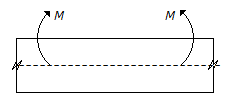Strength of Materials problems
- 1. A section of beam is said to be in pure bending, if it is subjected to
Options- A. constant bending moment and constant shear force
- B. constant shear force and zero bending moment
- C. constant bending moment and zero shear force
- D. none of the above Discuss
Correct Answer: constant bending moment and zero shear force
- 2. The columns whose slenderness ratio is less than 80, are known as
Options- A. short columns
- B. long columns
- C. weak columns
- D. medium columns Discuss
Correct Answer: short columns
- 3. The lower layer of the beam as shown in the below figure, will be

Options- A. in tension
- B. in compression
- C. neither in tension nor in compression Discuss
Correct Answer: in tension
- 4. A square beam and a circular beam have the same length, same allowable stress and the same bending moment. The ratio of weights of the square beam to the circular beam is
Options- A. 1/2
- B. 1
- C. 1/1.12
- D. 1/2 Discuss
Correct Answer: 1/1.12
- 5. The perpendicular distance between the centre lines of the successive rows, is called pitch.
Options- A. Agree
- B. Disagree Discuss
Correct Answer: Disagree
- 6. The values of equivalent length (L) and actual length (l) of a column for both ends hinged is the same
Options- A. Yes
- B. No Discuss
Correct Answer: Yes
- 7. When a body is subjected to a direct tensile stress (?) in one plane, then tangential or shear stress on an oblique section of the body inclined at an angle ? to the normal of the section is
Options- A. ? sin 2?
- B. ? cos 2?
- C. ?/2 sin 2?
- D. ?/2 cos 2? Discuss
Correct Answer: ?/2 sin 2?
- 8. The neutral axis of a transverse section of a beam passes through the centre of gravity of the section and is
Options- A. in the vertical plane
- B. in the horizontal plane
- C. in the same plane in which the beam bends
- D. at right angle to the plane in which the beam bends Discuss
Correct Answer: at right angle to the plane in which the beam bends
- 9. The distance between the centre of a rivet hole to the nearest edge of plate, is called
Options- A. margin
- B. pitch
- C. back pitch
- D. diagonal pitch Discuss
Correct Answer: margin
- 10. The change in length due to a tensile or compressive force acting on a body is given by (where P = Tensile or compressive force acting on the body, l = Original length of the body, A = Cross-sectional area of the body, and E = Young's modulus for the material of the body)
Options- A.

- B.

- C.

- D.
 Discuss
Discuss
Correct Answer:

More in Mechanical Engineering:
Programming
Copyright ©CuriousTab. All rights reserved.
